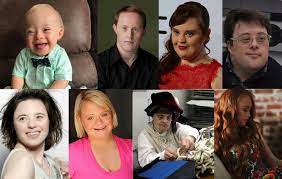
World Down Syndrome Day (WDSD) is a global awareness day that has been officially observed by the United Nations since 2012 on March 21.
According to the WDSD website, the date for WDSD being the 21st day of the 3rd month was selected to signify the uniqueness of the triplication (trisomy) of the 21st chromosome which causes Down syndrome.
PUNCH Online reports that the theme for this year’s campaign is “End the Stereotype.”
The Down’s Syndrome Foundation Nigeria, last week, lamented the non-inclusion of persons with intellectual disabilities in disability laws.
In this report, PUNCH Online culls opinions from the WDSD website where Down syndrome patients advocate the need to end the stereotype.
It read, “Stereotypes are harmful! For people with Down syndrome and intellectual disabilities, stereotypes can stop us from being treated like other people.
“We get treated like children. We are underestimated, and we are excluded.
“Sometimes we are treated very badly or even abused.”
Here are nine Down syndrome patients expressing their views:
Andrew from New Zealand said, “I used to work at a primary school. I was hoping to help with the school newsletters on the office computer.
“I presented my CV to the receptionist to show her what I can do. She asked me, ‘Who did this for you?’ I told her I did it. She did not believe that I made the CV, and she did not let me help her.”
Emma from the United Kingdom said, “I went to a clothes shop on my lunch break at work. I was looking at the different clothes.
“A lady who worked in the shop told me, ‘You aren’t going to buy anything, get out!’ I was so upset I couldn’t speak. I don’t deserve to be treated like that.”
Moyosore from Nigeria said, “I don’t like it when people look down at people with Down syndrome. On World Down Syndrome Day, we must come together with a common goal to change this.”
Muthoni from Kenya said, “Why do people think that people with Down syndrome can’t work? They also think we shouldn’t get paid! I work hard, and I deserve to be paid.”
Tia from the United States said, “I wanted to go to college, but because I have an intellectual disability, the only courses available to me were in ‘Life Skills’. I don’t want to go to college to learn to make my bed!”
Carlos from Mexico said, “People think that Down syndrome is a sickness. It is not! Down syndrome is a condition. We are like any other person. I want the world to see us for who we really are.”
Pearl from Switzerland said, “Some people think that people with Down syndrome can’t live ‘normal’ lives. That’s wrong! And what is ‘normal’ anyway?
“My life is similar to lots of my family and friends. I went to my local school, I’m involved in a local orchestra and the scouts. I am training to be a teaching assistant. All of this for me is ‘normal’, just like everyone else.”
Andrew from Australia said, “I am discriminated against because I have a disability. People don’t let me speak up for myself. But I can! I enjoy speaking to people about my life.”
Janet from Canada said, “People think that all people with Down syndrome are the same. We are not! My favourite thing is learning about different people and what they do.”
World Down Syndrome, special being
The United Nations officially recognised World Down Syndrome Day in 2011 and was first marked in 2012 to encourage member states, civil society organisations, and individuals to observe the day with activities and events that promote understanding and acceptance of people with Down syndrome.
Identifying whether someone has Down syndrome involves recognising certain physical characteristics and potential developmental or cognitive differences.
However, it’s important to note that not all individuals with Down syndrome will exhibit the same features, and the severity of characteristics can vary widely.
Additionally, the only way to definitively diagnose Down syndrome is through genetic testing.
Here are some common physical characteristics and developmental traits associated with Down syndrome that may aid in identification: distinctive facial features, low muscle tone (Hypotonia), short stature, and developmental delays among several others.



